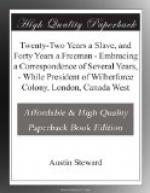Lewis returned to Wilberforce, flushed and swaggering with the idea of making his fortune in this speculation of a law-suit against Mr. Tappan; and to remove all obstacles, he sent a man to me, to say that if I would publish nothing, and would abandon the interests of the colonists, he would give me a handsome sum of money. I soon gave him to understand that he had applied to the wrong person for anything of that kind; and he then laid a plan to accomplish by fraud and perjury, what he had failed to do by bribery.
I have before mentioned the fact of my having taken up a note of twenty-five dollars for Mr. Lewis, on condition that he would soon refund the money. I did it as a favor, and kept the note in my possession, until about a year afterward, when I sued him to recover my just due on the note. We had then began to differ in our public business, which led to other differences in our transaction of both public and private matters relating to the colony. He of course gave bail for his appearance at court, and it ran along for some time until he found he could not bribe me to enter into his interests, and then for the first time, he declared that I had stolen the note! And finally succeeded in getting me indicted before the grand jury!
In this I suppose Lewis and his confederates had two objects: first, to get rid of me; secondly, that they might have a chance to account for my continued hostility, by saying that it arose in consequence of a private quarrel, and not for any true interest I had in their collecting money deceptively.
Lewis appeared so bent on my destruction, that he forgot it was in my power to show how I came by the note. The Court of King’s Bench met, but in consequence of the cholera, was adjourned, and of course, the case must lie over until another year.
When the time for the trial drew near, I was, in the midst of my preparations to attend it, counseled and advised by different persons to flee from the country, which I had labored so hard and so conscientiously to benefit, and received in return nothing but detraction and slander. But conscious of my innocence, I declared I would not leave; I knew I had committed no crime; I had violated no law of the land,—and I would do nothing to imply guilt. He who hath formed the heart, knoweth its intent and purpose, and to Him I felt willing to commit my cause. True, the court might convict, imprison, and transport me away from my helpless family of five small children; if so, I was determined they should punish an innocent man. Nevertheless, it was a dark time; I was not only saddened and perplexed, but my spirit was grieved, and I felt like one “wounded in the house of his friends,”—ready to cry out, “had it been an enemy I could have borne it,” but to be arraigned, for the first time in my life, as a criminal, by one of the very people I had spent my substance to benefit, was extremely trying. Guiltless as I knew myself to be, still, I was aware that many incidents had transpired, which my enemies could and would construe to my disadvantage; moreover, Lewis had money, which he would freely distribute to gain his point right or wrong, and to get me out of his way.




